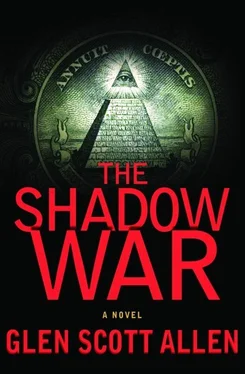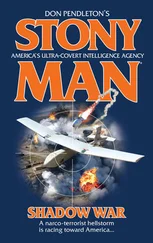Glen Allen - The shadow war
Здесь есть возможность читать онлайн «Glen Allen - The shadow war» весь текст электронной книги совершенно бесплатно (целиком полную версию без сокращений). В некоторых случаях можно слушать аудио, скачать через торрент в формате fb2 и присутствует краткое содержание. Жанр: Триллер, на английском языке. Описание произведения, (предисловие) а так же отзывы посетителей доступны на портале библиотеки ЛибКат.
- Название:The shadow war
- Автор:
- Жанр:
- Год:неизвестен
- ISBN:нет данных
- Рейтинг книги:5 / 5. Голосов: 1
-
Избранное:Добавить в избранное
- Отзывы:
-
Ваша оценка:
- 100
- 1
- 2
- 3
- 4
- 5
The shadow war: краткое содержание, описание и аннотация
Предлагаем к чтению аннотацию, описание, краткое содержание или предисловие (зависит от того, что написал сам автор книги «The shadow war»). Если вы не нашли необходимую информацию о книге — напишите в комментариях, мы постараемся отыскать её.
The shadow war — читать онлайн бесплатно полную книгу (весь текст) целиком
Ниже представлен текст книги, разбитый по страницам. Система сохранения места последней прочитанной страницы, позволяет с удобством читать онлайн бесплатно книгу «The shadow war», без необходимости каждый раз заново искать на чём Вы остановились. Поставьте закладку, и сможете в любой момент перейти на страницу, на которой закончили чтение.
Интервал:
Закладка:
Beyond the window, the modern St. Petersburg skyline was still beautiful. One could see all the way down Nevsky Prospekt to the dual snakes of lights lining the Neva River. During the day, from this vantage, one could make out the Winter Palace, sometimes even the Peter and Paul Fortress across the Neva.
The bearlike man stepped over to the bed, lowered his bulky frame onto it, which made the mattress bounce-as well as the now-quiet body lying across it, which now looked merely passed-out drunk; an impression reinforced by the near-empty bottle of Koskova vodka on the nightstand. The heavyset man reached into his pocket, took out a pair of latex gloves, slipped them with some effort over his thick hands. Then he reached over and took the vodka bottle and the half-full glass next to it. He stood, walked with them into the bathroom, where he poured the remaining vodka from both down the sink. He used a washcloth to wipe them clean, then, holding the bottle and glass gingerly, walked back into the room and set them carefully back on the nightstand.
He surveyed the room: a suitcase on top of the dresser, a small valise leaning against the closet.
He went through the suitcase first. Finding nothing of interest, he indifferently repacked the clothes, set the suitcase where he'd found it.
Taking the valise to the bed, he unzipped it. Tucked in a pocket was a Russian passport. The name there was just as it should be.
Fyodor Ivanovich Myorkin.
Behind the passport were press credentials in Fyodor's name from Svobodniye Rossia Novosti, the Free Russia News.
He found the journalist's notebook, flipped it open. It was filled with notes from Fyodor's visit that day to the Tsentral'nyi gosudarstvennyi arkhiv Sankt-Peterburga, the Central State Archives of St. Petersburg, housed in its squat, Soviet-style blockhouse on Varfolomeevskaia.
He nodded, satisfied, and pocketed the notebook. He was about to zip the valise closed when he noticed a letter, tucked down inside a pocket. He extracted the envelope, pulled out the single page, careful not to wrinkle it.
It was handwritten in Russian. He scanned the text quickly. It was from an American academic doing work on the Holodnaya Voyna, the Cold War. The academic wrote that he'd read some of Myorkin's earlier articles exposing secrets of Soviet policies; then he asked politely if Myorkin had ever, in his own research, come across any references to something called Borba s tenyu?
The man read the contents again, his lips moving as he read, committing the important parts to memory. He was about to tuck the letter back into its envelope when he thought to check the signature at the bottom of the letter and find out who this Americanski was, writing to the late Mr. Myorkin.
Jeremy Fletcher, it read.
He repeated the name to himself. Then he replaced the letter in the valise, glanced about the room once more, and, with a last nod to the peaceful Fyodor on the bed, he opened the door, checked the hallway, and left.
CHAPTER 6
Natalya hadn't been able to resist. She'd puttered around her apartment in the morning, watering plants, cleaning dishes, looking through mail… all in an attempt to distract herself from thinking about the strange letter she'd received from Dr. Jeremy Fletcher. All to no avail.
But before she'd left her apartment, Yuri had called to invite her to dinner with some of the embassy staff. They were going to the Russkiy Dom restaurant, over on Connecticut. Was she interested? Under pressure and wishing to stay in Yuri's good graces, she finally said yes, perhaps.
So eventually she found herself at the embassy, almost alone. The white walls and shining stone floors created a sense of cavernous emptiness. Yet once there and with Fletcher's letter before her, she still wanted to postpone her investigation. She decided to check on some of the details for the embassy's reception for the Bolshoi the coming Monday evening.
They were using an American caterer rather than the embassy's own kitchen-money had changed hands there, she was sure-and as soon as she looked at the menu faxed over from the caterer's the day before, she knew there was a problem.
Borsch was on the menu. Which for Americans, she knew, meant a watery beet soup with a mass of sour cream dumped on top.
That wasn't borsch. At least not Russian borsch.
Russian borsch was more of a stew, with beef, onions, potatoes, peppers… How, she wondered, did Americans think Russians had survived on beets in hot water?
And then she saw that caviar was also on the menu-no doubt served with chopped eggs, onions, chives, black olives, and probably half a dozen other garnishes, all of which were another American invention-like chop suey-and there for people who actually didn't like the taste of fish eggs.
But true Russians did, and enjoyed their caviar with nothing more complicated than hard bread and butter. And they probably would serve red caviar as well as black, but unless the red caviar was sevruga, it would be an insult at such an important dinner.
A half hour later she hung up the phone, having tactfully if forcefully explained all this to a Mr. Foy, the manager of the catering service.
"Well, of course," he'd said finally, exasperation evident, "if that's what you want. We strive to be ethnically authentic."
Ethnically authentic? The Soviet Union may have fallen, but she was sure Mr. Foy thought of Russians with the same old Cold War cliches: borsch-slurping, vodka-swilling, caviar-snob savages who just happened to possess nuclear weapons.
Would Americans and Russians ever truly understand one another? Was that even possible between two such vastly different cultures, one formed by Enlightenment logic, the other steeped in centuries of Pagan mysticism?
She realized she was still distracting herself from Fletcher's letter.
She carefully unfolded Fletcher's letter and read it again. Perhaps she was reluctant to dive into it because he had provided so very little to go on: he was doing research on the Cold War period, specifically 1960-1970; he was particularly interested in documents concerning Russian nuclear war strategies-a word, curiously, he'd translated as stzenariy, which meant something more like screenplay, rather than the more literal strategija; she shrugged and read on-and he wondered if Natalya had any knowledge of a particular book about such stzenarii, something called Borba s tenyu… though, he admitted, he wasn't sure if it was a book, a report, a memorandum… or even if that was the title at all.
Well, the subject and period provided her with at least one clue: if whatever Fletcher was after had been published in the Soviet Union between 1960 and 1970, and it was about Soviet nuclear arms strategy, then it couldn't possibly have been an official Soviet publication. So it could only have been samizdat: something produced unofficially by one of the dozens of small illegal presses run from basements by brave, idealistic dissidents-which would only make tracking it down all the more difficult.
The first reference she discovered wasn't a book at all, but rather a film; a silent film at that, titled Borba za Ultimatum, a title translated into English as The Fight for the Ultimatum Factory. But it was much too early, 1923.
Natalya thought for a moment. The word borba was old Russian; in fact, its roots could be traced to the Serbo-Croatian;Борба, which meant simply "struggle." So she tried the search from that angle.
This soon revealed that Borba had been the title of a newspaper in Belgrade, printed by the League of Communists of Yugoslavia. Nuclear secrets published in a Party paper in Belgrade? Unlikely. But then perhaps tenyu, shadow or shade, was the pseudonym of a dissident writer for the paper, someone using the Party organ to expose its own secrets?
Читать дальшеИнтервал:
Закладка:
Похожие книги на «The shadow war»
Представляем Вашему вниманию похожие книги на «The shadow war» списком для выбора. Мы отобрали схожую по названию и смыслу литературу в надежде предоставить читателям больше вариантов отыскать новые, интересные, ещё непрочитанные произведения.
Обсуждение, отзывы о книге «The shadow war» и просто собственные мнения читателей. Оставьте ваши комментарии, напишите, что Вы думаете о произведении, его смысле или главных героях. Укажите что конкретно понравилось, а что нет, и почему Вы так считаете.












